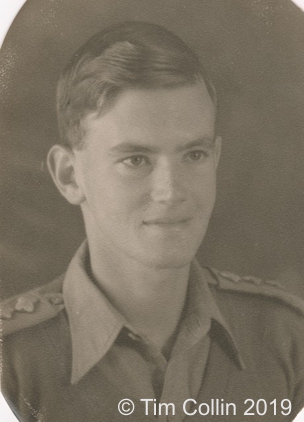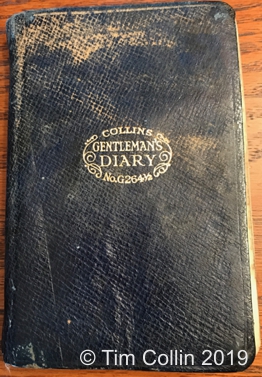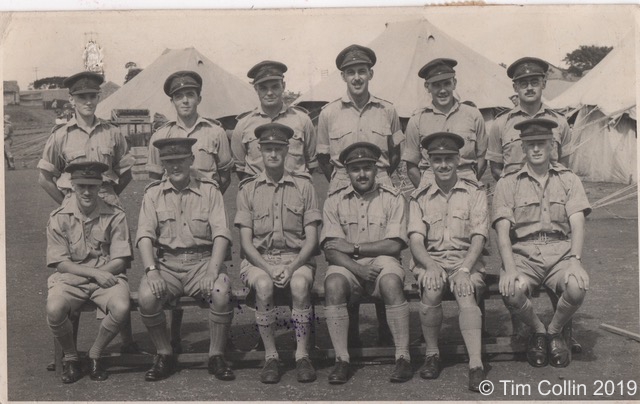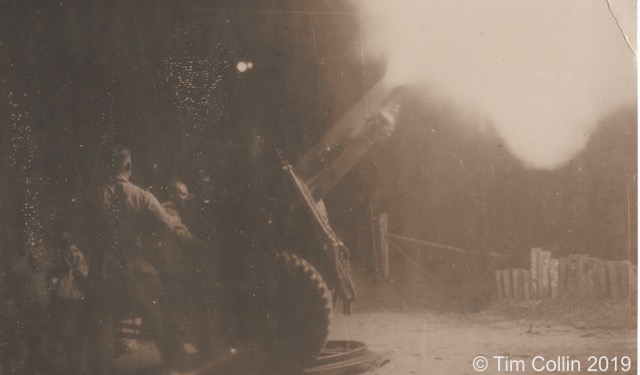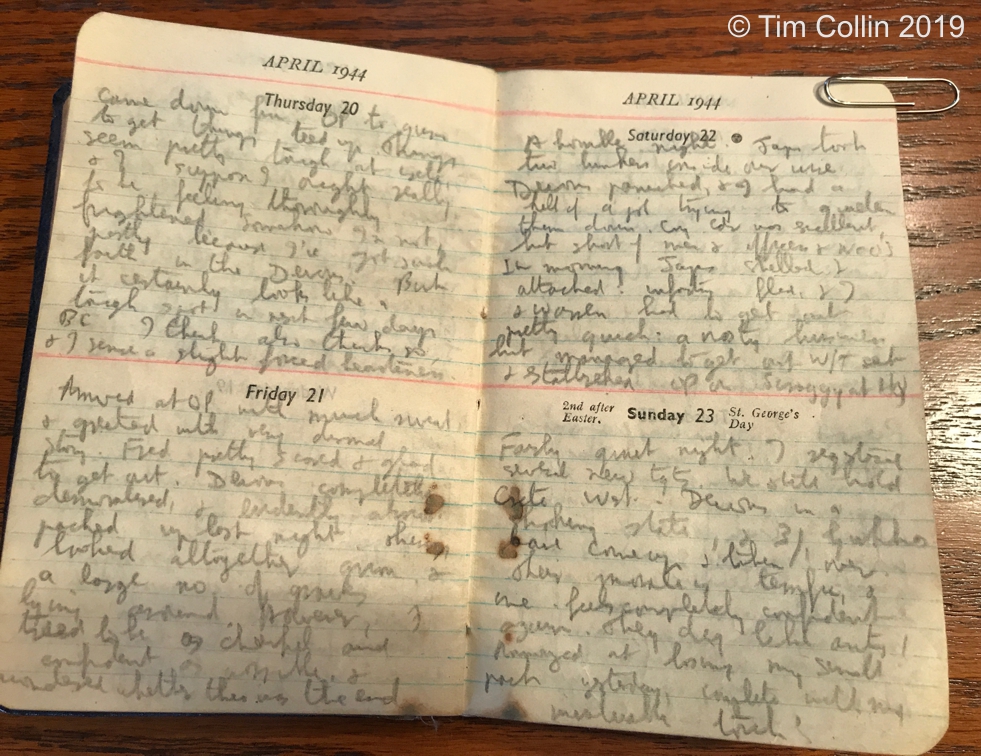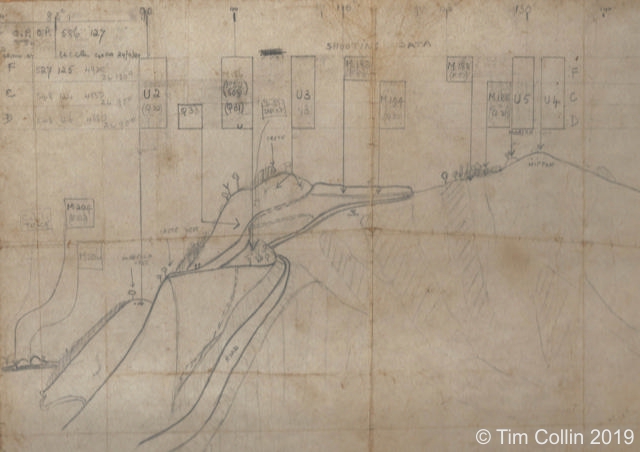1944 Diary of Captain Geoffrey De Egglesfield Collin, M.C.
Captain Geoffrey De Egglesfield Collin, M.C. served with the Royal Artillery during the Second World War. In 1943, he sailed with his regiment for the Far East and throughout 1944 he kept a personal diary of his experiences in India, Ceylon and Burma. His diary was later transcribed by his daughter-in-law, Carolyn, and has now been made available by his son, Tim Collin.
Captain Geoffrey Collin. The photograph was taken in Ceylon, probably shortly after his arrival in 1942.
Captain Collin’s diary describes in detail almost every aspect of military life. He spares few details of the tedium and frustration he experienced during long stays in hospital as a result of illness. He also writes of his experiences as a Forward Observation Officer (F.O.O.) at the battle of Imphal, where several times he came under Japanese artillery fire and was at great personal risk from being killed or captured by Japanese infantry. On one occasion, when his Observation Post was overrun by the enemy and the infantry defending the position had already withdrawn and the Japanese were actually on the position, he remained behind to cover his party as the men withdrew with the wireless set. For his actions during this time, he was subsequently awarded the Military Cross.
Geoffrey Collin was born in Ceylon on 18th July 1921, the son of a veteran of the Boer and First World Wars. He was later sent away to school in England where he eventually attended Wellington College. Following the outbreak of the Second World War, he was commissioned and joined the 114th Field Regiment, Royal Artillery. In February 1942, the Regiment left Glasgow in a troop ship for the Far East. After two and a half months, the Regiment arrived at Bombay on 11th May 1942 and went to Secunderabad. In June, the Regiment moved to Bangalore where it came under command of the 20th Indian Infantry Division. On 4th July 1942, the Regiment moved to Ceylon with the Division. All concerned began intensive jungle warfare training in anticipation of future operations in Burma. During his time in Ceylon, Captain Collin trained with the Navy as a naval Forward Observation Officer.
Group photo of officers of the 114th (Sussex) Field Regiment, R.A. Captain Geoffrey Collin is standing back row, far left.
When the Regiment left Ceylon for Ranchi, India, Captain Collin was separated from the unit and sent for further combined operations training at Juhu, on the coast to the north of Bombay. Captain Collins’ diary begins here on 1st January 1944.
Captain Collin, not surprisingly, was enthusiastic to share news with friends and family at home in the United Kingdom and elsewhere. On Wednesday, 5th January 1944, he wrote:
“Drew my issue - 3 months - of air letter cards and wrote home. Glad I have got my supply guaranteed for a bit. Tragedy - Egan has come back and taken his gramophone and records. However, he is only one block behind me so I can still hear it at times. Night march started at mid-night.”
The life of a soldier in the Far East often involved illness and, for many, a stay in hospital. Captain Collin had several bouts of sickness, all of which left him feeling frustrated at what he might be missing out on. On Monday, 10th January 1944, he wrote:
“Still feeling mouldy, had a strong dose of salts which I trust may have beneficial results as well. Feeling very depressed at this out of sorts condition, dislike missing marches and training.”
Two days later he was in hospital:
“Whisked off to hospital, suspected Jaundice. Really very pleasant to be able to relax at last. Wish I could overcome continuous sickness feeling. Otherwise not too bad. Colaba Hospital pretty good. Plenty of room. Awful ride here in ambulance with Indian driver.”
He often received word of his friends, not all of it good. Following the deaths of two friends, on Monday, 24th January 1944 he recorded his frustration at not yet having seen action:
“A very black day. Got up for two hours and telephoned Major Robertson who told me that John had been killed in flying accident, Mrs Robertson taking it badly, and I won’t go and see them for bit yet. I can’t hardly believe it’s true; never again to see old mother Robertson. That’s two of my best friends killed, both Johns. I pray that Bill and David will be spared. All done something in the war except me. I could almost kill myself if nothing happens soon, eternally waiting and waiting and nothing happening.”
After his recovery, he was sent on sick leave, first to Bombay and then to the hill station at Ooty (Udhagamandalam) in Tamil Nadu. Upon arrival on Monday, 7th February 1944, his delight is obvious:
“Glorious scenery arrived here, arrived at Officer’s hostel about 2.00. Seems a glorious place got Doc here to give me a run over but gave a favourable report, just said must take things very easily. Sharing a room with Wigram and one other; own bathroom beautifully equipped. Glorious hot bath and a bed with piles of blankets!”
Night firing of a 25-pounder of the 114th (Sussex) Field Regiment, R.A. Date and location are unknown however the photo was probably taken during training.
In March 1944, Captain Collin’s wish for action was finally granted and he travelled to rejoin the 114th Field Regiment then at Moreh, on the border between India and Burma. On Wednesday, 22nd March 1944, he wrote:
“Reached the Regiment and am in 479 as extra Captain. Because 100 Brigade forming a stop here in Moreh, with a lot of Gunners. Fighting to last man last round. Regiment evidently had a party, and did very well, before coming back from Iitak. Jap force evidently about 1 ½ Divisions with tanks and artillery. John Boss is up on Shark, a hill about 1,500 yards away and being heavily attacked, two other attacks also developing tonight.”
At the end of the month, the 114th Field Regiment withdrew from Moreh and on 1st April 1944, Captain Collin found himself in the Shenam area. As a F.O.O., he needed to be in the front line to have a good view of enemy positions and movements in order to bring down artillery fire in support of the troops he accompanied. Captain Collin wrote about the difficulties and extreme dangers he faced with his fellow soldiers. He spared few details of the gravity of the situations he found himself in, yet rarely expressed his own fears and emotions. As is perhaps typical of the men of that time, he often skirted around his feelings, preferring instead to rely on understatement or to make a small joke. On Wednesday, 5th April 1944, he wrote:
“Moved forward to a very exposed position, only a few hundred yards from the Japs. Most of the digging already done thank goodness. I share a small hole with a Battery Commander and his assistant, just room to turn round. Have taken over Barrett as Batman, heaven help me! My official number on the radio net is 13 - good luck!”
The fighting with the Japanese soon intensified. Captain Collin wrote a detailed account of the fighting on 10th April 1944 for the position he occupied, known as “Morgan” Hill – this can be read here.
Entries for April 1944 in the diary of Captain Geoffrey Collin. It is fascinating to think that these entries were written in a front line trench surrounded by the Japanese
During a subsequent action, Captain Collin was nearly killed or captured when the Japanese overran the position on Saturday, 22nd April 1944:
“A horrible night. Japs took two bunkers just inside our wire. Devons panicked and I had a hell of job trying to quieten them down. Company Commander was excellent but very short of men officers and NCO’s. In the early morning Japs shelled and attacked; our infantry fled, and I and one bugler had to get out pretty quick; a nasty business but we managed to get out the wireless set and established OP on Scraggy Hill.”
He subsequently expanded upon these events in a passage that manages at one and the same time to give a real sense of the danger and also the potential for the humour often present in even the worst of situations:
“…… in the end there was nobody left on the position except about six of us, and it was agreed we should leave as best we could; this involved for my party of four men a run along the top of a crest fully exposed, for about 200 yards. I sent on my first signaller carrying part of the wireless set, and he very nearly got to the far side before the Japs opened fire on him, but he managed to get over the lip of the hill, but not before his braces broke and his trousers came down around his ankles which was quite a remarkable sight! I then sent the other two men of my party at intervals, and finally I and the Company Commander left almost together and ran for our lives! “
One of the tools of an artillery observer is a self-made sketch of the potential target area. Key features in the landscape are included together with direction and ranging data. The sketch made and used by Captain Collin at Shenam Ridge has survived and can be seen here.
The vivid descriptions of the fighting with the Japanese around Imphal continue in this vein until Captain Collin departs by plane for Calcutta, on Saturday, 20th May 1944.
“Suddenly heard last night to fly out today. Frantic goodbyes. Flew Imphal and arrived Calcutta 4.30pm most comfortable and interesting journey in DC3. Spent some time looking out of door and wondering what it would be like to parachute! Perhaps not too bad I hope! Excellent accommodation at grand hotel now at Officers hostel. Seems incredible to be really back in civilization. Paddy and Wiggy and others are also here.
(It was a remarkable transformation to come out of an area which was in close contact with the Japs, by air and in a few moments to be in the civilization of Calcutta; at the same time I was still feeling extremely groggy and sick.)”
The diary records the events that follow. Captain Collin describes being sick again, the joys of being on leave and his gradual restoration to health as undertook more training with F.O.O.s and the Navy in the provision of gunfire support to troops ashore. In June 1944, he was posted to Karachi, where on Sunday, 18th June 1944 he wrote of a more mundane conflict:
“After terrific battle and much loss of temper managed to get my laundry back from the dhobi in time and refused to pay him. Left Karachi 4:40, hope to get to Bombay in three days with a good journey. Not sorry to leave Imal Himilaya, and looking forward to a decent dhobi at Juhu also a batman and a good mess and mail!”
In August 1944, he became badly ill once again, this time with amoebic dysentery, resulting in another stay in hospital. On Tuesday, 8th August 1944 he wrote:
“Funny being back here in hospital again. Don't really feel ill but can't eat much. They insist on me staying in bed, blast it. Spencer and three others here also. Quite a contingent! Stomach not feeling so good and I only hope that they find out something definite.”
Four days later, his illness was confirmed:
“Was today subjected to the indignity of the sigmoidoscopy! I have definitely got amoebic dysentery. What a frightful thought. It means four weeks course at least and it's pretty bloody. In a way I am glad that at last I know definitely what's wrong because I have not really been at all fit these last few months. Bill and Paddy came today and took me to tea.”
The current transcript of the diary ends in October 1944. The current version can be read here. Please note that the diary is copyright and all enquiries for reproduction should be forwarded to Tim Collin via this website (email address at the foot of the page).
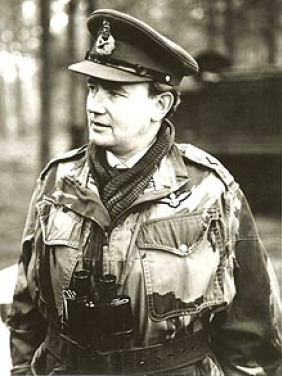
Post-war photo of Major-General Geoffrey de Egglesfield Collin, M.C.
Captain Collin later returned to Ceylon for yet more training with the Navy and then returned to the 20th Indian Infantry Division to fight with the 114th Field Regiment in the drive to Rangoon. After the war, trained as a pilot with the R.A.F. before being posted to 652 Air O.P. Squadron in Germany. He had a long and successful career in the Regular Army, remaining with the Royal Artillery throughout. He retired in 1976 with the rank of Major-General. He married Angela Stella Young in 1949 and together the couple had a son and three daughters.
I am indebted to Tim Collin, son of Geoffrey Collin, for granting permission to publish the diary and accompanying texts in full.
A podcast of a five-part interview with Major-General Geoffrey Collin is available to listen to at Interview with Major General Collin (opens in new window). The podcast notes describe the interview as: "A fascinating in-depth Interview with Major General Collin MC, CB, DL. This five part interview covers his military career including active operations at the Battle of Imphal in 1944, commanding a tactical nuclear missile regiment during the Cold War, through to his final command in North Yorkshire and his retirement."
23 June 2020
